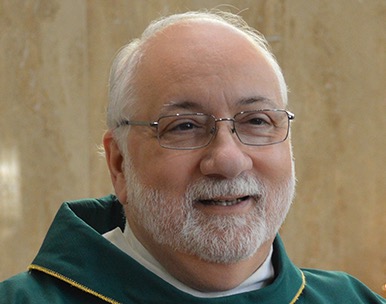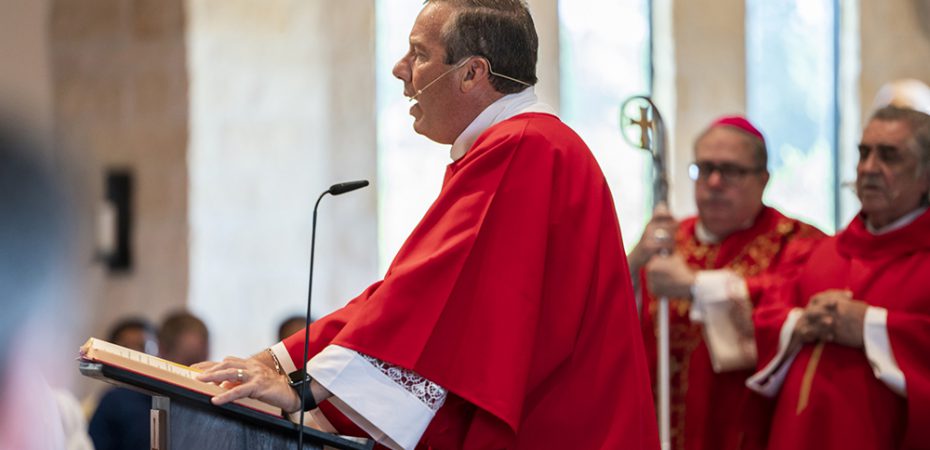The Preaching Deacon
Deacon Dominic Cerrato 2
 According to the General Instruction to the Roman Missal, “The homily should ordinarily be given by the priest celebrant himself or be entrusted by him to a concelebrating priest, or from time to time and, if appropriate, to the deacon, but never to a lay person” (No. 66). The term “time to time” is translated from the Latin pro opportunitate, which can also be translated, “if fitting.” Such an interpretation would mean that the deacon preaches depending on the circumstances and always with the permission of the celebrant.
According to the General Instruction to the Roman Missal, “The homily should ordinarily be given by the priest celebrant himself or be entrusted by him to a concelebrating priest, or from time to time and, if appropriate, to the deacon, but never to a lay person” (No. 66). The term “time to time” is translated from the Latin pro opportunitate, which can also be translated, “if fitting.” Such an interpretation would mean that the deacon preaches depending on the circumstances and always with the permission of the celebrant.
Across the dioceses of the United States, pro opportunitate within the context of the liturgy has been interpreted rather broadly. Practically speaking, and in most cases, the frequency of this preaching is decided by the pastor. Most have the deacons preach regularly, while others rarely.
Deacons have been characterized, rather unfairly I think, as bad preachers. No doubt some are. However, like priests, many deacons, if not most, can preach well. Perhaps much of the criticism is a result of many deacons not having the opportunity to preach with any regularity. A minimalist approach to pro opportunitate might have the deacon preach 10 times a year, something a newly ordained priest might easily do in two weeks. This rate of preaching significantly diminishes the deacon’s ability to hone his homiletic content and his manner of delivery. It also limits the deacon’s ability to connect personally with the people within the context of the liturgy, something that renders his other ministries more effective.
It’s interesting to note that liturgical preaching enters the Church not through the priesthood but through the diaconate. At ordination, the deacon is ontologically configured to Christ the Servant and receives the sacred power (sacram potestatem) to exercise his ministry under his bishop for the good of the Church. This power is expressed in the ability to perform specific religious acts, acts not possible prior to ordination. Among these is the ability to preach within the context of the liturgy.
This is beautifully expressed in the diaconal ordination rite when the newly ordained deacon kneels before his bishop. The bishop then places the Book of the Gospels in his hands, saying: “Receive the Gospel of Christ whose herald you have become. Believe what you read, teach what you believe, and practice what you teach.” In this moment, as a result of his ordination, the deacon receives the power and authority to proclaim the Good News, and that proclamation includes preaching.
The idea that preaching is proper to the diaconate is not as radical as it might seem. The first one to pick up his cross and follow Jesus unto death did so by preaching. This man was not an apostle, a bishop nor presbyter, but the protodeacon Stephen (cf. Acts 7).
Because the diaconate has a unique role in the mystery of salvation, the order has, by this very fact, a unique contribution to the life of the Church. Without the diaconate, the presence of Christ the Servant is diminished. Though his ministry can’t be reduced to liturgical preaching any more than other clergy, it is, nonetheless, an important aspect of his vocation, an aspect the faithful need to hear, including priests and bishops. In this way, complementing his other ministries, the deacon can bring his unique gifts to the life of the Church and, in this way, contribute to her mission.
DEACON DOMINIC CERRATO, Ph.D., is editor of The Deacon and the director of diaconal formation for the Diocese of Joliet, Illinois. He is the founder of Diaconal Ministries, where he gives national presentations and retreats to deacons and diaconal candidates. Follow him on Facebook to continue the conversation.






Comments are closed.